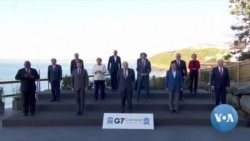The Group of Seven offers developing countries an alternative to China’s so-called “Belt and Road Initiative.”
Hello and welcome to VOA Asia Weekly. I'm Chris Casquejo in Washington. That story is coming up.
But first, making headlines.
Indonesian President Joko Widodo met with Ukrainian President Volodymyr Zelensky before heading to Russia to meet leader Vladimir Putin in the hope of reviving peace talks.
U.S. President Joe Biden, South Korean President Yoon Suk Yeol and Japanese Prime Minister Fumio Kishida met on the sidelines of the NATO summit in Madrid. This is the first time South Korea attended the NATO summit. It announced it will establish a mission in the Western Military Alliance.
China's Foreign Ministry spokesman defended preventing Taiwan from joining the U.N. Ocean Conference after the pacific island nation of Tuvalu, an ally of Taiwan, withdrew from the conference.
Chinese President Xi Jinping arrived Thursday in Hong Kong ahead of celebrations marking 25 years since the city was turned over from Britain to China.
Fuel supplies are nearly exhausted in debt-ridden Sri Lanka. The country sent two government representatives to Russia to negotiate for fuel.
An ASEAN regional envoy for the crisis in Myanmar wrote a letter to the country’s military leaders urging them to end deposed leader Aung San Suu Kyi’s solitary confinement and return her to house arrest.
The Group of Seven leaders launched a $600 billion global infrastructure initiative they say will compete with China’s Belt and Road Initiative. But analysts say this ambitious proposal has some issues. VOA White House correspondent Anita Powell reports from Austria, with reporting from Patsy Widakuswara in Washington.
This week, the Group of Seven leaders launched a $600 billion global infrastructure initiative they say will compete with China’s Belt and Road Initiative. But analysts say this ambitious proposal has some issues. VOA White House correspondent Anita Powell reports from Telfs, Austria, with reporting from Patsy Widakuswara in Washington.
The G-7 Partnership for Global Infrastructure and Investment plans to offer developing nations $600 billion in infrastructure funding by 2027, as an alternative to China’s massive Belt and Road Initiative. President Joe Biden unveiled the proposal at the G-7 summit in Germany.
"What we're doing is fundamentally different because it's grounded on our shared values of all those representing the countries and organizations behind me. It is built using the global best practices: transparency, partnership, protections for labor and the environment."
A third of the funding comes from the U.S. and the rest from other wealthy G-7 nations using modest government investments and establishing high standards designed to leverage private sector financing.
The initiative is a relaunch of the Build Back Better World plan, announced by G-7 leaders last year.
“The West had really been asleep at the wheel for a number of years on this use of connectivity – infrastructure connectivity as a means of extending foreign policy influence. And so they are now coming together on a united project to sort of push this.”
The G-7 plan will focus on digital connectivity, gender equity, health security, climate and energy security – areas seen as not yet dominated by China’s investments.
It’s billed as a better alternative than BRI, which has been criticized as “debt trap diplomacy” that Beijing employs to expand its influence.
But meeting Western standards of labor and environment may prove challenging for countries.
“Due to the level of ease of Chinese investments – these are often quite attractive, because at the end of the day when you're a developing country, you want the infrastructure now.”
Beijing slammed the initiative as a "zero-sum game approach.”
"We oppose the moves that advance geopolitical calculations and smear the Belt and Road Initiative in the name of promoting infrastructure development."
In the nine years since it was launched, nearly 150 countries have signed up for China’s BRI – so far totaling over 2,600 projects with a combined value of $3.7 trillion, according to data analysis firm Refinitiv.
Anita Powell, VOA News, Telfs, Austria.
Visit our website voanews.com for the most up-to-date stories. This is VOA Asia Weekly.
Filipino journalist and Nobel Peace Prize winner Maria Ressa said that the Philippines government is affirming a previous order to shut down Rappler, the news website she co-founded. Rappler gained notoriety for its reporting of outgoing President Rodrigo Duterte's bloody crackdown on illegal drugs. Ressa said Rappler will stay in business until all legal appeals are exhausted.
Finally on VOA Asia Weekly, an Indonesian villager captured a crocodile measuring more than four meters using just a thin rope.
Video of Usman and his son wrangling the mighty croc went viral in Indonesia.
Conservation officials took the crocodile to release it in a less populated area.
Thanks for watching VOA Asia Weekly. I’m Chris Casquejo. See you next week.












